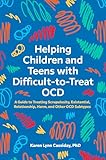Helping children and teens with difficult-to-treat OCD : a guide to treating scrupulosity, existential, relationship, harm, and other OCD subtypes / Karen Lynn Cassiday.
Material type: TextPublisher: London : Jessica Kingsley Publishers, 2023Description: 220 pages ; 23 cmISBN: 9781839974427Subject(s): Obsessive-compulsive disorder in children -- Treatment | Obsessive-compulsive disorder in adolescence -- TreatmentLOC classification: RJ506.025 | .C37 2023Summary: Treating subtypes of OCD, such as scrupulosity, harm, existential, and relationship OCD, in children and adolescents can often present a wealth of challenges. The nature of these lesser-known subtypes can make delivering common aspects of OCD treatment, including planning relevant exposures, and incorporating key adults in the child's treatment, difficult. Drawing from years of professional experience, Karen Lynn Cassiday provides comprehensive guidance using a wealth of case examples on how you can overcome these hurdles in the therapy room. Whether a newly qualified or experienced clinician, this book is essential for all practitioners wanting to tackle the clinical dilemmas generated when treating complex OCD in children, teens, and emerging adults.
TextPublisher: London : Jessica Kingsley Publishers, 2023Description: 220 pages ; 23 cmISBN: 9781839974427Subject(s): Obsessive-compulsive disorder in children -- Treatment | Obsessive-compulsive disorder in adolescence -- TreatmentLOC classification: RJ506.025 | .C37 2023Summary: Treating subtypes of OCD, such as scrupulosity, harm, existential, and relationship OCD, in children and adolescents can often present a wealth of challenges. The nature of these lesser-known subtypes can make delivering common aspects of OCD treatment, including planning relevant exposures, and incorporating key adults in the child's treatment, difficult. Drawing from years of professional experience, Karen Lynn Cassiday provides comprehensive guidance using a wealth of case examples on how you can overcome these hurdles in the therapy room. Whether a newly qualified or experienced clinician, this book is essential for all practitioners wanting to tackle the clinical dilemmas generated when treating complex OCD in children, teens, and emerging adults.
| Item type | Current location | Call number | Copy number | Status | Date due | Barcode |
|---|---|---|---|---|---|---|
 Books
Books
|
College Learning Resource Center General Circulation | CIR RJ506.025 .C37 2023 (Browse shelf) | 1 | Available | CL12817 |
Browsing College Learning Resource Center shelves, Shelving location: General Circulation Close shelf browser

|

|

|

|

|

|

|
||
| CIR RC480.5 .H36 2024 The Handbook of person-centered psychotherapy and counselling / | CIR RJ486.6 .B37 2004 Neuropsychological evaluation of the child / | CIR RJ503.5 .K43 2010 Casebook in childhood behavior disorders / | CIR RJ506.025 .C37 2023 Helping children and teens with difficult-to-treat OCD : a guide to treating scrupulosity, existential, relationship, harm, and other OCD subtypes / | CIR T10.5 .So714 2024 Technical communication : Effective communication skills : The Key to success / | CIR TX911.3 .M3H828 2024 Hospitality and tourism marketing : building customer driven hospitality and tourism organizations / | CIR TX911.3 .M27G87 2024 Aviation hospitality management / |
Includes bibliographical references (pages 212-216) and index.
Treating subtypes of OCD, such as scrupulosity, harm, existential, and relationship OCD, in children and adolescents can often present a wealth of challenges. The nature of these lesser-known subtypes can make delivering common aspects of OCD treatment, including planning relevant exposures, and incorporating key adults in the child's treatment, difficult. Drawing from years of professional experience, Karen Lynn Cassiday provides comprehensive guidance using a wealth of case examples on how you can overcome these hurdles in the therapy room. Whether a newly qualified or experienced clinician, this book is essential for all practitioners wanting to tackle the clinical dilemmas generated when treating complex OCD in children, teens, and emerging adults.


There are no comments on this title.